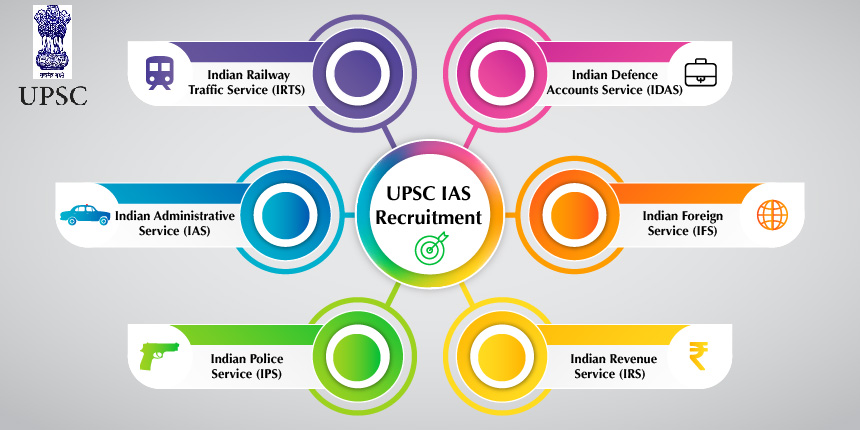Civil services in India are classified into 2 major categories-
(i)All India Services and
(ii)Central Services.
About All India Services:
The All India Services are common to both the central and state governments and the members of these services hold key positions under both the Center and the states and serve them in turn.
Presently, there are three All India Services:
- Indian Administrative Service (IAS)
- Indian Police Service (IPS)
- Indian Forest Service (IFoS)
The All India Services are jointly controlled by the State and Central Governments. However, the ultimate control rests with the central government and any disciplinary action against these officers can be taken only by the central government, while the immediate control lies with the state governments.
About Central Services:
The officers of the Central Services work under the exclusive jurisdiction of the Central Government. They hold special positions in various departments of the central government. Central services are further classified into 2 groups.
Group ‘A’ Services
At present, there are 60 groups of A’ central services. some of them are:
- IP&TAFS-Indian P&T Accounts and Finance Service
- IAAS-Indian Audit and Accounts Service
- IRS-Indian Revenue Service (C&CE)
- IDAS-Indian Defense Account Service
- IRS-Indian Revenue Service (IT)
- IOFS-Indian Ordnance Factory Service
- IPOS-Indian Postal Service
- ICAS-Indian Civil Accounts Service
- ASC (RPF)-Assistant Security Commissioner
- IDES-Indian Defense Estates Service
- IIS-Indian Information Service
- ITS-Indian Business Service
- ICLS-Indian Corporate Law Service
Among all, the Indian Foreign Service (IFS) is the most prestigious and highest central service in terms of status, salary, and emoluments. Though it is a central service, it comes after IAS in the ranking and its pay scale is higher than that of IPS. It competes with All India Services in terms of position, status, and pay scale.
Most of the Central Services Group A cadres also have Group B services. Central Service Group C consists of clerical personnel and Group D consists of manual personnel. Therefore, Groups A and B include gazetted officers, and Groups C and D are non-gazetted.
The best coaching for the civil services examination after the 12th is IAS Coaching in Dehradun.
Group ‘B’ Services
Some examples of Group ‘B’ services are:
- AFHCS-Armed Forces Headquarters Civil Services
- Danix-Delhi, Andaman & Nicobar Islands, Lakshadweep, Daman & Diu Dadra & Nagar Haveli Civil Service
- DANIPS-Delhi, Andaman and Nicobar Islands, Lakshadweep, Daman, Diu Dadra, and Nagar Haveli Police Service
- PCS-Pondicherry Civil Services
- PPA-Pondicherry Police Service
- The recruitment process of Central Civil Services is done through the Civil and Engineering Services Examination of UPSC and the Combined Graduate Level Examination of Staff Selection Commission (SSC).
About Indian Administrative Service (IAS):
Controlling Authority: The Ministry of Personnel, Public Grievances, and Pensions
Recruitment: UPSC Civil Services Exam
Responsibilities and Training:
IAS officers handle government affairs and formulate policies in various areas of importance like finance, commerce, administration, etc. They revise policies as and when required and implement them through various means. On attaining a higher rank, an IAS officer can represent the government in another country or in various bilateral and multilateral fora, and at certain ranks (deputy secretaries) they can also sign agreements on behalf of the government.
Officers assume various responsibilities and perform very diverse roles like a collector, chief secretaries, commissioners, heads of public sector units, cabinet secretaries, etc.
IAS officers are appointed after a probation period of two years in regional offices, training schools, a district magistrate’s office, and a secretariat.
Initially, the officer works as a sub-divisional magistrate and performs functions such as handling law and order, implementing development works in the designated area, and general administration.
The top-rank civil servant in any state is the chief secretary of that state, who is usually assisted by an additional chief secretary, deputy commissioner, or district magistrate.
Some other prestigious posts: Home Secretary, Finance Secretary, and Development Commissioner.
About Indian Forest Service (IFoS):
Controlling Authority: Ministry of Environment, Forest and Climate Change
Recruitment: Through Indian Forest Service Examination by UPSC
The Indian Forest Service, one of the three All India Services, was constituted by the Government of India under the All India Services Act, 1951 in the year 1966.
Responsibilities:
The major mandate of IFoS officers is the proper implementation of the National Forest Policy which envisages a sustainable environment, ecological balance, and scientific management of forests. IFOS officers are independent of the district administration and exercise administrative, financial, and judicial powers in their area.
- IFS officers also work in many wildlife and forest-related organizations such as:
- Indira Gandhi National Forest Academy (IGNFA)
- Forest Survey of India
- Wildlife Institute of India
- Wildlife Crime Control Bureau (WCCB) etc.

